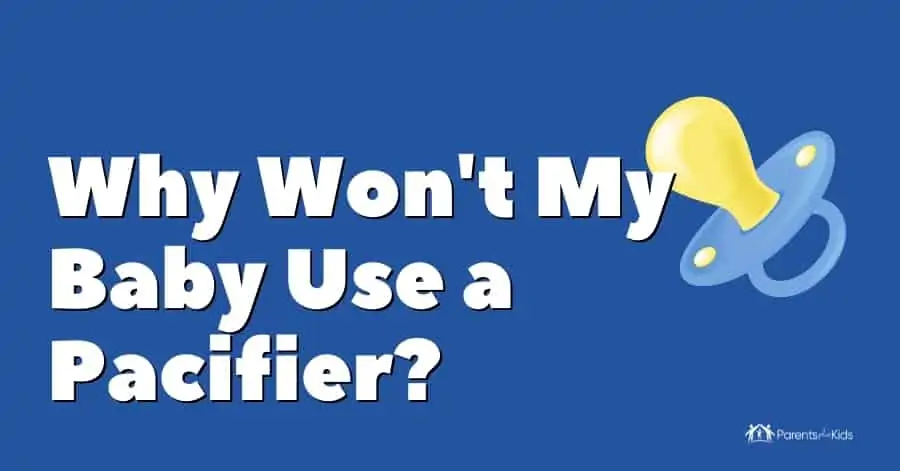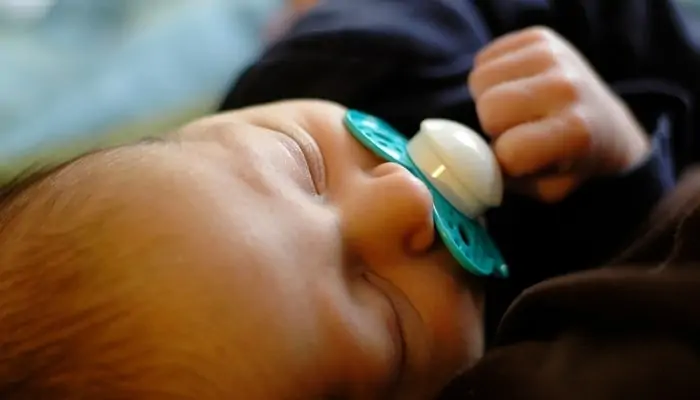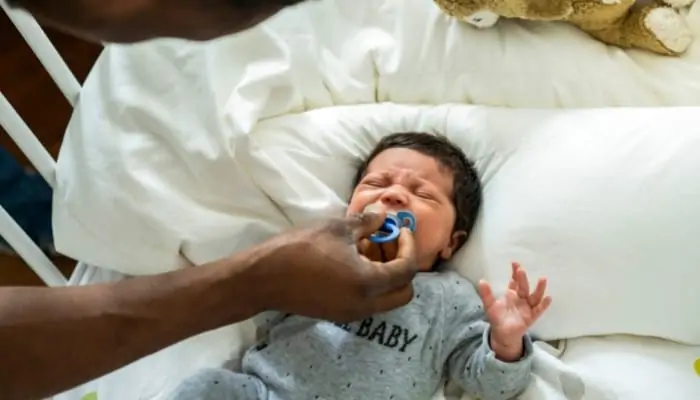Why Won’t My Baby Use a Pacifier?

This post may contain affiliate links. If you buy through the link, I may earn a commission. Learn More.
An unexpected question many parents find themselves asking is, “Why won’t my baby take a pacifier?” While pacifiers seem like a no-brainer, some children just don’t want them.
Luckily, there are a few proven tricks to successfully get a binky in the mouths of even the most stubborn baby.
*FYI, some of the links in this article about why won’t my baby use her pacifier may be affiliate links. If you click and make a purchase, we may get a commission (at no extra cost to you). For more info, please see our disclaimer.
Why Won’t My Baby Use a Pacifier?
Some babies are resistant because they don’t like the shape or style of the pacifier. Others may dislike the feeling or frequency. You might also be using the wrong size pacifier for the age of your kid. Lastly, some babies, regardless of how hard you try, just don’t like pacifiers.
Pacifier Aversion: What it is and How to Turn it Around

The American Academy of Pediatrics recommends that babies use pacifiers to help with sleep and the prevention of Sudden Infant Death Syndrome (SIDS). Parents who decide to follow this guidance may find some resistance to the pacifier.
This is called “pacifier aversion.” For most babies, determined parents should be able to break past pacifier aversion and ensure the pacifiers are used as needed.
Medical Issues and Oral Aversion
Some babies have medical reasons to avoid pacifiers. They might have difficulty breathing when they have something in their mouths. Babies with gastrointestinal issues may associate pacifiers with pain.
Call your pediatrician if you suspect your baby may have a medical reason for pushing the pacifier away. Don’t push the pacifier until you have a definitive answer. Your baby’s doctor will be able to help you understand whether your baby should use a pacifier and how to best introduce it.
Not Reading the Cues
Parents may be pushing the pacifier at the wrong time. A baby might be crying because they’re hungry, sleepy, bored, or in need of a diaper change. The common response to a fussy baby is a pacifier, but if the baby has a real issue that needs to be addressed, a pacifier won’t do the trick.
Pay attention to when your baby is pushing the pacifier away. Try some alternatives to managing the fussiness before you reintroduce the pacifier. Attempt to give your baby a pacifier once their needs have been met.
Related: What to Do if Your Baby Hates Diaper Changes?
Baby Doesn’t Like the Shape
I had at least a dozen different types of adorable pacifiers for my son. They had nipples of varying shapes, bright colors, and fun designs. He loved them all equally, which made life really easy for mom and dad.
When his sister came along, it was a different story. There was only one style of pacifier that was good enough for her. When we finally found the one that she would take, we bought as many as we realistically could.
Keep looking if your baby is pushing away the pacifiers you have. There are countless varieties of pacifiers with nipples that come in soft, medium, and hard consistency.
There are some shaped to the contours of the mouth and some that are shaped more like rubber stoppers. It doesn’t hurt to try all of them until you finally find the one your baby enjoys.
How to Introduce the Pacifier
Babies born in hospitals are given pacifiers unless it is requested by the parents, in advance, that they not receive these calming tools. Experts believe that the pros of pacifiers outweigh the cons.
However, most think you should wait until the baby is one month old before introducing a pacifier. This is especially true if the baby is being nursed.
At the one-month mark, slowly slide the pacifier into your baby’s mouth immediately after they have finished nursing or taking a bottle. They will continue to suck on the pacifier as if they’re still eating.
They might start to push the pacifier away when no food appears. Combat this by tugging lightly on the pacifier, which encourages the baby to suck harder to keep it in their mouth.
When to Throw in the Towel

Some babies may never become attached to their pacifiers. Parents who want to take advantage of the health benefits can keep trying. However, at some point, it might become apparent that it’s not going to happen.
Try as much as you like, but don’t take your pacifier pushing to an extreme level that causes anxiety for you and your baby. Give your baby some time away from the pacifier and give yourself a break.
Plenty of babies are happy and healthy without having ever met a pacifier.
One Last Thing About Pacifiers to Keep in Mind
The American Academy of Pediatrics recommends that pacifiers not be used in the second six months of life. Studies have shown an increase in ear infections among babies who use pacifiers past six months old.
If your baby reaches this threshold while you’re still attempting pacifiers, it’s probably best to give up and conserve your energy for when your baby is a teenager.
Have you had any problems with pacifiers? What have you tried? Let us know what worked and what didn’t by posting in the comments!
Have You Read Any of These Yet?
- Do Baby Wipes Expire?
- Can I Return Baby Formula?
- 10 Awesome New Mom Life Hacks
- How to Get My Child to Sleep Without a Pacifier
